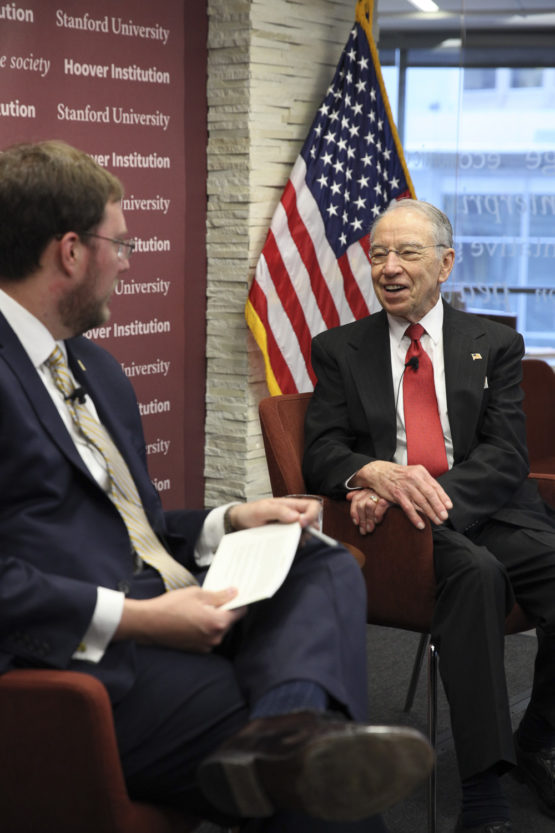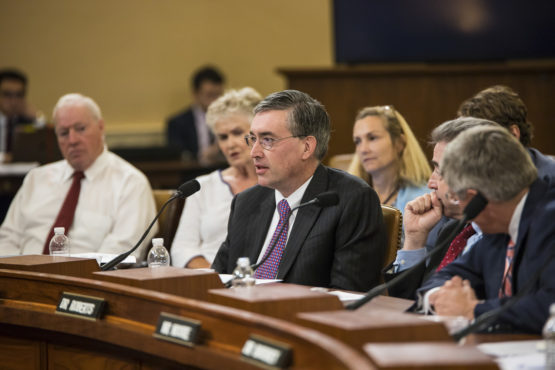Hoover in D.C. puts scholars in conversation with policymakers
The Hoover Institution’s Washington office offers a place for policymakers and political scientists to ask big-picture questions.
When policymakers in Washington D.C. want an outsider perspective on a problem, they don’t need to leave the nation’s capital to get a 10,000-foot view.

Hoover Research Fellow Adam White, left, interviews Sen. Chuck Grassley in Washington. (Image credit: Rick Reinhard)
Bringing policy-relevant insight from the Stanford campus nearly 3,000 miles away to Capitol Hill is the Hoover Institution’s Washington, D.C. branch. It’s there that Hoover fellows – scholars committed to understanding public policy and its applications – can engage with policymakers and their advisers on legislative issues through public events, policy forums, media roundtables and congressional briefings.
At these events, Hoover scholars present their research, often relevant to congressional work, to people from across the political spectrum. Being part of an academic institution offers an independence atypical of other Washington think tanks, said Michael Franc, the director of the Washington, D.C. programs at Hoover.
“Being an academic institution operating on the academic model means Hoover briefings are not dismissed as being the product of some ulterior motives and agendas,” Franc said. “Hoover scholars are seen as straight shooters; the arguments and data they offer are the product of their own independent thinking.”
Congressional briefings
Recently, for instance, Hoover fellows Herbert Lin and Amy Zegart travelled to Washington to deliver a Capitol Hill briefing on their research into cybersecurity and discuss what is required for the United States to more effectively understand and engage in offensive cyber operations. Their presentation was part of a year-long briefing series on national security and technology that Hoover organized for congressional staffers.
Like many Hoover fellows, Lin and Zegart have had extensive experience working in government themselves. Lin served on President Obama’s Commission on Enhancing National Cybersecurity; Zegart was a member of the Clinton administration’s National Security Council staff and later a foreign policy adviser to the Bush‑Cheney 2000 presidential campaign.
“I have been the congressional staffer on the other side, so I know both sides of it,” said Lin, the Hank J. Holland Fellow in Cyber Policy and Security. While there are trade-offs to switching from government to academia, he said, Hoover’s congressional briefings and Washington outreach offer him the chance, as a scholar, to engage with policy issues first-hand.
“Being in government has an immediacy that can’t be beat – scholars like us must stay engaged with policymakers to understand their concerns if our research is to be policy-driven, which is our intent,” Lin said.
But these congressional briefings are not about offering policy prescriptions, Lin said. Instead it is about providing a big-picture perspective on issues affecting the country. “We offer a different lens with which to view existing policy proposals – more like helping them to be more informed consumers of policy proposals from others,” he said.
And while Hoover fellows can provide policymakers with insight into issues, sometimes policymakers can help scholars better understand questions and challenges in the policy arena, said Zegart, the Davies Family Senior Fellow.
“That interaction helps inform my research,” she said. “And our research, in turn, can help craft better policy by asking new questions, marshaling new evidence and taking a longer view that policymakers often just don’t have the time to consider.”
Scholars, policymakers in conversation
The Hoover D.C. branch has also provided Hoover fellows a space for events that put scholars in public conversation with policymakers.
For example, last year research fellow Adam J. White held an ongoing conversation series about American constitutionalism. As part of the series, he hosted a public talk with Sen. Chuck Grassley (R-IA). The two debated the role and responsibilities of the Senate during the judicial confirmation process as well as presidential oversight. White also moderated a conversation with Sen. Mike Lee (R-UT) and Rabbi Meir Soloveichik about the relationship between religion and the American government.
“These interviews were remarkably substantive and insightful discourses on our Constitution and the role these lawmakers – who themselves are officers of the Constitution – play in the day-to-day interplay between and among the three branches of our government,” Franc said.
Grassley spoke candidly about how individuals are nominated and confirmed to serve on a court, Franc said, noting, “It’s not every day that sitting lawmakers have the opportunity to expound in this way.”
Bringing Capitol Hill to California
In addition to Hoover engaging with congressional staff in Washington, D.C., every spring 25 staffers come to Stanford through the Stuart Family Congressional Fellowship Program. Over two days, they participate in intensive seminars – deep dives into ongoing policy research – with Hoover fellows and other scholars.
These seminars provide opportunities for congressional staff to build relationships with scholars engaged in policy-relevant areas, Franc said. Last year, for instance, congressional fellows discussed issues such as the North Korean nuclear program, recent protests in Iran, political polarization, national security and artificial intelligence, and education, among other topics.
Here, too, Hoover strives for bipartisanship in its selection of congressional fellows, Franc said. Each cohort is balanced by chamber, party affiliation, and type of position (for example, personal offices of Congress members, professional committee staff and staff who work in House and Senate leadership offices). And when the fellows return to Washington, they encourage colleagues to apply for a slot in the next delegation, Franc said. “These instances of follow-up, moreover, are very bipartisan in nature.”
Providing testimony
Thanks also in part to Hoover’s outreach efforts in Washington, fellows are often asked to present their research before congressional committees, Franc said.
In 2018, Russell Roberts, the John and Jean De Nault Research Fellow at Hoover, spoke before the Joint Economic Committee about the changes in the U.S. economy and Americans’ earnings and living standards. Senior Fellow Josh Rauh testified before the Joint Select Committee on Solvency of Multiemployer Pensions to share his research into when a retirement plan is making sufficient contributions. And Senior Fellow Scott Atlas testified before the Joint Economic Committee at a hearing about health care reform. These are only a few examples.
“Capitol Hill is used to having special interest groups pushing their own proposals and agendas,” Zegart said. “But at Hoover, we don’t have a dog in the fight of policy A or policy B. We go where the data and scholarship lead. That’s very different. I think or certainly hope that congressional staff see us as an independent resource to help them craft policy that strengthens American national security.”
For more information about the Hoover Intuition’s Washington, D.C., programming, visit https://www.hoover.org/dc.

